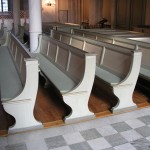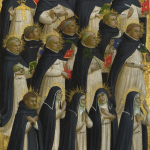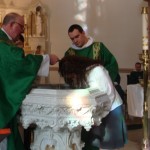A few days ago, I was praying the Midday Prayer of the Divine Office, and I was struck by the juxtaposition of two of the psalms slated for that day (Wednesday, 31st week of ordinary time). First there was this part of Psalm 70:
O God, make haste to my rescue,
Lord, come to my aid!
Let there be shame and confusion
on those who seek my life.O let them turn back in confusion,
who delight in my harm,
let them retreat, covered with shame,
who jeer at my lot.
Which was shortly followed by an excerpt form Psalm 75 which included:
For neither from the east nor from the west,
nor from desert or mountains comes judgment,
but God himself is the judge.
One he humbles, another he exalts.The Lord holds a cup in his hand,
full of wine, foaming and spiced.
He pours it; they drink it to the dregs:
all the wicked on the earth must drain it.
Begging for shame and confusion on the wicked is a long way from asking that they be punished or obliterated. Shame is the natural feeling of the bully or the sinner, but usually, we try and find a way to twist away from that feeling, as quickly as we’d pull our hand back from a stove. I can flinch from a still-hot burner, because it is not part of myself, but I’ve already gone a fair way into confusion when I try to disassociate from my own actions and their consequences.
Praying to be allowed to retreat, covered in shame, or hoping that someone would offer this prayer for me, is asking to be reunited with myself and delivered from the freedom to act with callousness. I’d rather struggle with cognitive dissonance, acknowledging my own hypocrisy, than go on in a feeling of pleasant certainty and righteousness.
Of course, when I say this is what I’d prefer, I mean it’s what I’d prefer in the abstract. Preferring it in the everyday is still a struggle. So I find a kind of strange hope in the second psalm included in that day’s prayer. In this section, when the psalmist speaks of judgment, he tells us that the Lord will humble the wicked, but the means of their justice is baffling.
God offers them a cup of wine, which, for Catholics, always has eucharistic undertones, and bids us to drink fully. None of the lines that follow tell us that the wicked will choke on it or find it turns to ashes on their tongues. But it doesn’t take much work to imagine straining to accept mercy, or that humbling judgement might take the form of showing you what was always available to you, if you’d only stopped contorting yourself away from confusion, shame, and honesty.
In the first and second psalm, deliverance looks like punishment, until you’ve come out on the other side and can give thanks for the confusion that stayed your hand before you struck a blow or the shame that came just in time to keep you from speaking uncharitably or the mercy that followed you all the way to the end of the world, asking of you only that you accept the wholeness that you were meant for, even if it means acknowledging that you spurned this peace for your whole life… up to now.

















